
Carrie Bourassa, PhD
Chair of Northern & Indigenous Health at the Health Sciences North Research Institute
Scientific Director, CIHR Institute of Indigenous Peoples’ Health
Read Bio
Carrie Bourassa is a Chair in Indigenous & Northern Health and Senior Scientist at Health Sciences North Research Institute in Sudbury, Ontario and the Scientific Director of the Institute of Indigenous Peoples’ Health at the Canadian Institutes of Health Research. Prior to taking the Chair position in October 2016 and the Scientific Director Position in February 2017, she served her communities as a Professor of Indigenous Health Studies at First Nations University of Canada for fifteen years.
Dr. Bourassa is an Indigenous community-based researcher and is proud to be the successful Nominated Principal Investigator on two Canada Foundation for Innovation Grants that funded the Indigenous Community-based Health Research Lab in 2010 (re-named Morningstar Lodge) and most recently in April 2016 the Cultural Safety Evaluation, Training and Research Lab (renamed Thunderbird Medicine Lodge) in Sudbury. She is a member of the College of New Scholars, Artists and Scientists of the Royal Society of Canada and is a public member of the College Council, Royal College of Physicians and Surgeons of Canada. Carrie’s research interests include the impacts of colonization on the health of Indigenous people; creating culturally safe care in health service delivery; Indigenous community-based health research methodology; HIV/AIDS, HCV among Indigenous people; end-of-life care among Indigenous people; dementia among Indigenous people, Indigenous Water Governance and Indigenous women’s health. Carrie is Métis, belonging to the Regina Riel Métis Council #34.

Benjamin Brookwell
Associate, Olthuis, Kleer, Townshend LLP
Read Bio
Benjamin Brookwell is an associate at the law firm OKT. Benjamin’s practice focuses on litigation and negotiation in the areas of Aboriginal and treaty rights, the duty to consult and accommodate, and environmental issues. He is committed to finding creative solutions to protect Indigenous rights using all the tools of Canadian law.
Benjamin and his colleagues at OKT advise Indigenous clients on self-government and jurisdiction, social services, employment, labour and human rights law, and on governance structures and policies to meet clients’ goals of building self-determining and accountable governments that reflect their Indigenous laws.

Glenda Burnouf, SDT, RDH
Program Manager, Onion Lake School Dental Program,
Onion Lake Cree Nation, Saskatchewan
Read Bio
Glenda is currently the Program Manager of the Onion Lake School Dental Program in Onion Lake Cree Nation in Saskatchewan. She is a dental therapist and graduated from the National School of Dental Therapy in Prince Albert, SK in 1993. She is also a dental hygienist and graduated from Saskatchewan Institute of Applied Science and Technology Wascana Institute in Regina, SK in 1995. Since graduating she has been involved in the dental field in many capacities: she worked as a dental hygienist in private practice from 1995-1998 and then moved on to a dental therapist position with the Children’s Dental Program in Mamawetan Churchill River Health District from 1998-2001.
In 2001 she joined the teaching staff at the National School of Dental Therapy as an educator/instructor until 2006. For the next 7 years she worked as a clinical dental therapist in the school-based dental programs in two Northern Health Authorities: Mamawetan Churchill River and Keewatin Yatthe. In her last year she was the prenatal dental therapist who focused on prenatal/0-5 year old children in the entire Health Region. She then moved on to the school-based dental program in Onion Lake Cree Nation as a clinical dental therapist and later became the Program Manager of the program. Glenda currently serves as President of the Saskatchewan Dental Therapists Association, the licensing and registration body for dental therapists in Saskatchewan.

Karen Cederwall
Senator, Kenora Métis Council
Read Bio
Karen grew up connected to, and living from her traditional lands, in Northwestern Ontario. She has received a formal education but maintains her connections to her Métis way of life and community. Karen is a descendent of the 1875 half breed adhesion to Treaty #3.
Her formal postsecondary education includes: Honors BSc in Fish and Wildlife Management, Bachelor of Education, Diploma of Nursing, and an Aboriginal Resource Technician Diploma. She also recently graduated from an Anishinabemowin Immersion Program. During her early career, as a biologist and technician with the Ontario Ministry of Natural Resources on Lake of the Woods and its watersheds, she performed work relating to water quality, fisheries and wildlife assessment, wild rice and mercury fish sampling.
She currently serves as a local Métis Canadian member on the International Rainy Lake of the Woods Watershed Board, and is also a full-time Teacher with the Adult Education Secondary School with Seven Generations Education Institute (SGEI) in Kenora, Ontario. Education, environment, community, connections to the land, and working with youth to promote and maintain our Métis Way of Life, is important for Karen.
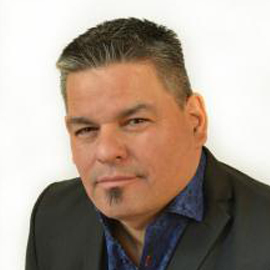
Ontario Regional Chief Isadore Day
Wiindawtegowinini, Serpent River First Nation
Ontario Regional Chief, Assembly of First Nations National Health Portfolio
Read Bio
Ontario Regional Chief Isadore Day is from Serpent River First Nation, Ontario, which is located in the North Channel of Lake Huron. Born in Elliot Lake and raised in the North, Regional Chief Isadore Day worked in construction, commercial fishing, and in the social services setting. Regional Chief Day’s post-secondary education consists of Social Work, Business and Public Administration and Governance. He and his partner Angela raise their girls in the North and are committed to ensuring that the North remains a key grounding in their lives. He is strong in his commitments to his community and all treaty regions.
Regional Chief Day is an Anishnabe with strong values and ideals about his heritage and has a strong ability to bridge contemporary mainstream ideals and traditional insights and teachings. He has a very strong affinity and connection to the land.
He has been Chief of Serpent River FN since being elected in 2005. Regional Chief Day has a combined total of ten years in leadership. Public service ideas and dedication have seen him involved in various boards, committees, and volunteer positions over the past 15 yrs. With a list of diverse attributes and skills, Regional Chief Day has been welcomed at many tables to share in efforts to make constructive change for the Anishnabek and First Nations at the Regional and National level in recent years. Known as hard hitter on the issues, he has a demeanor that seeks to find ways to highlight and uplift the dignity of others.
He believes that Youth in general have vision and hold leadership keys for success that need to be tapped and brought to the table and legitimized in formal process. His current and recent posts include: various portfolios as Lake Huron Regional Chief;various committees with the Union of Ontario Indians and Chiefs of Ontario. His work at the national level includes a wide range of files.
In 2006, Regional Chief Isadore Day addressed President Bill Clinton in the Ontario Economic Summit and asked the president to reflect on his discussion from the vantage point of First Nations. He was reciprocated with a lengthy input from the president. He has also been quite active with many other levels of leadership from the Prime Ministers Office, the Ontario Premier and scores of MP’s – all focused on one thing: the First Nation Agenda. Chief Day is noted across the country as a visible and relevant leader. He prides himself by being part of a great line of leaders and is a strong team player. He is a natural when called to be a lead advocate on most political files.
Today, Regional Chief Day is quite active on many files in all policy sectors at the local level and provincially. His main focus at all tables with government is First Nation rights, health, social, economies, infrastructure, Quality of Life – and overall, Nationhood based on all facets of what a nation embodies. He sees political justice as being the main goal for First Nation leaders and is emphatic that the Indian Act is colonial oppression and at the root of what must change in all First Nations. He is practical with both high level policy and is a strong grassroots First Nation leader.
As the Ontario Regional Chief, Chief Isadore Day seeks to establish any available partnership that is consistent to placing the future of the Next Generation as a key priority and beneficiary to collective efforts and respect for treaties on which Canada was founded.

Judy Da Silva
First Nations
Read Bio
Judy Da Silva is a mother to 5 youth. They help her to have the positive energy to continue to look for justice for the solution of the mercury poisoning of their river system in Grassy Narrows and Mother Earth. She recently was awarded the Michael Sattler Peace Prize in Germany and Human Rights Watch Award in Toronto in recognition of her lifelong work to advocate for her community members for environmental protection in a peaceful nonviolent direct action. Judy lives in Grassy Narrows and suffers from the effects of mercury poisoning in a mild form. She works in the band office of her community as Environmental Health Coordinator.

Margaret Froh
President, Métis Nation of Ontario
Read Bio
Margaret Froh is a Métis lawyer and educator whose career has focused on promoting and supporting strong and healthy Métis, First Nation and Inuit organizations and communities through effective governance, institutions, law, policy and reconciliation processes.
On May 11th, 2016, Margaret became the new President of the Métis Nation of Ontario, succeeding President Gary Lipinski following his recent retirement. Prior to being elected President, Margaret served as the Associate Chief Operating Officer for the MNO. Margaret has also served as in-house legal counsel to the MNO since 2013.
Margaret has been appointed to various committees and advisory groups focusing on access to justice for Indigenous Peoples in Ontario. In 2013, she was appointed by the Province of Ontario to the Debwewin Jury Review Implementation Committee — the committee tasked with overseeing Ontario’s implementation of the 2013 report issued by former Supreme Court of Canada Justice Frank Iacobucci regarding the lack of First Nation representation on Ontario Juries. In September 2014, she was also appointed to Ontario’s new Aboriginal Justice Advisory Group that will advise the Attorney General on Indigenous justice issues.
Margaret is a former President of the Indigenous Bar Association in Canada – the national non-profit professional association representing Métis, First Nations and Inuit lawyers, judges, law professors and students. She is the current Chair of the Indigenous Bar Association’s Law Student Scholarship Foundation, and a former long-time board member and President of Aboriginal Legal Services. She served over eight years as part of the in-house legal counsel group for the Chippewas of Rama First Nation before joining the Métis Nation of Ontario’s senior management team in 2013.
Margaret has guest-lectured in a variety of settings, has taught as adjunct faculty at the University of Toronto Faculty of Law, and is a lead faculty member for the Banff Centre’s Indigenous Leadership & Management Program teaching in the areas of Indigenous governance, leadership and management.

Valerie Gideon, PhD
Mik’maq Nation of Gesgapegiag, Quebec
Assistant Deputy Minister, Regional Operations,
First Nations and Inuit Health Branch (FNIHB), Health Canada
Read Bio
Dr. Valerie Gideon is a member of the Mik’maq Nation of Gesgapegiag, Quebec, Canada. She currently holds the position of Assistant Deputy Minister, Regional Operations, First Nations and Inuit Health Branch (FNIHB), Health Canada. In 2011-2012, she was Director General, Strategic Policy, Planning and Analysis at FNIHB. From 2007-2010, she held the position of Regional Director for First Nations and Inuit Health, Ontario Region, Health Canada. Prior to working at Health Canada, her experience consisted mainly of working in First Nations health advocacy as Senior Director of Health and Social Development at the Assembly of First Nations and Director of the First Nations Centre at the National Aboriginal Health Organization.
She was named Chair of the Aboriginal Peoples’ Health Research Peer Review Committee of the Canadian Institutes of Health Research in 2004. She graduated from McGill University (Montreal) in 2000 with a Ph.D. (Dean’s List) in Communications (dissertation pertaining to telehealth and citizen empowerment). She previously completed a Masters of Arts in 1996 at McGill. She is a founding member of the Canadian Society of Telehealth and former Board member of the National Capital Region YMCA/YWCA.

Carol Hopkins
Lenape Nation
Executive Director, Thunderbird Partnership Foundation
Read Bio
Carol Hopkins is the Executive Director of the Thunderbird Partnership Foundation (a division of the National Native Addictions Partnership Foundation) and is of the Lenape Nation at Moraviantown, ON. Carol Hopkins has spent 20 years in the field of First Nations addictions and mental health. She holds both a Masters of Social Work Degree from the University of Toronto and a degree in sacred Indigenous Knowledge, equivalent to a PhD in western based education systems. Carol also holds a sessional faculty position in the school of social work at Kings University College at Western University.
Carol has co-chaired national initiatives known for best practice in national policy review and development, resulting in the: First Nations Mental Wellness Continuum Framework (FNMWC), the Honouring Our Strengths: A Renewed Framework to Address Substance Use Issues Among First Nations in Canada, the Indigenous Wellness Framework, and best practice guidelines for culturally based inhalant abuse treatment. Carol has also inspired the development of the Native Wellness Assessment. In recognition of this work, Carol received the Champions of Mental Health Award 2015 for Research/Clinician, the Health Canada Innovations Award, is a member of the leadership advisory council to the Ontario Minister of Health and Long-Term Care and was invited by Minister of Health, Dr. Jane Philpott, to join the Canadian delegation to the United Nations General Assembly, Special Session on the World Drug Problem.

Elva Jamieson
Six Nations
Read Bio
Elder Elva Jamieson, a retired teacher, works with the Six Nations Health Team and palliative team in Six Nations of the Grand River, Ontario as a traditional medicine practitioner. Elva is from the Cayuga Nation of the Six Nations of the Grand River Territory. She belongs to the Wolf Clan family of the Longhouse where she sits as Faithkeeper since she was a teenager.
Elva strongly believes in ceremony and its ability to help us adapt to different changes we experience on our Life Path. Although she has the ability to conduct a range of traditional healing services on a holisitc/spiritual level to help guide people toward their personal healing, she considers herself a “Plant Person.” Elva had been taught local traditional medicines through her mother who was also well-known for her indigenous knowledge of plants and their use. Elva has incorporated all this knowledge toward her commitment to preserve our languages, culture, spirituality, and to reawaken the Onkwehonwe faith in their ability to heal themselves.
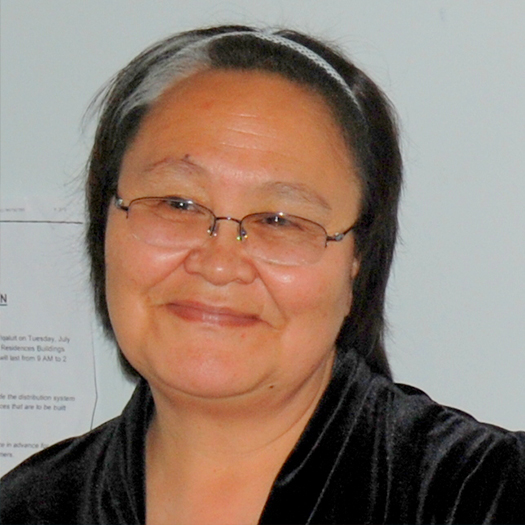
Meeka Kakudluk
Inuit
Read Bio
Meeka Kakudluk was born in Padloping Island. She is a retired teacher (37 years of service) based in Ottawa Ontario.
Meeka Graduated from the Teacher Education Program in Fort Smith N.W.T. in 1976. She has taught grades K-3 in Pangnirtung, Qikiqtarjuaq and Iqaluit. She has also served as vice-principal at Joamie School.
Meeka is a graduate of McGill University and is one of the first Inuit to graduate from a Masters program (UPEI) in 2009 with Elisapee Karetak.
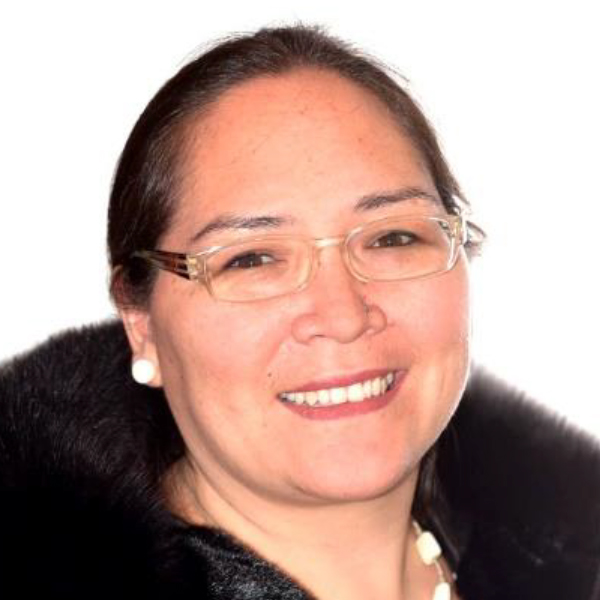
Aluki Kotierk
Inuit
President, Nunavut Tunngavik Incorporated
Read Bio
Ms. Aluki Kotierk was sworn in as the 8th President of Nunavut Tunngavik Incorporated on December 13, 2016. During her campaign, Aluki focussed on empowerment, Inuit language and culture, collective healing and Inuit identity.
Originally from Igloolik, Aluki lives in Iqaluit with her family. Aluki grew up in a bi-cultural home as the oldest of seven children.
After attaining a bachelor’s and master’s degree in from Trent University, Aluki worked for various Inuit organizations including Pauktuutit Inuit Women of Canada, Inuit Tapirisat of Canada (now Inuit Tapiriit Kanatami) and Nunavut Sivuniksavut. Aluki returned to Nunavut where she has held several senior management positions in the Government of Nunavut and the Office of the Languages Commissioner. Kotierk was most recently Director of Inuit Employment and Training for NTI.
Aluki has a passion to empowering and improving Inuit lives and has a keen interest in how Inuit culture and language could be better incorporated into the way programs and services are delivered.
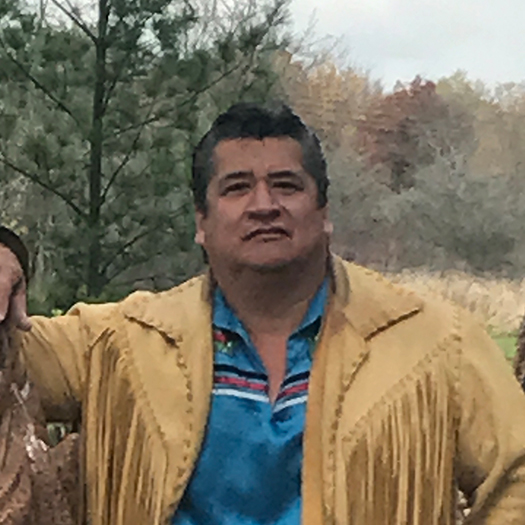
Chief R. Stacey Laforme
Mississaugas of the New Credit First Nation
Read Bio
R. Stacey Laforme is the elected Chief of the Mississaugas of the New Credit First Nation (MNCFN). Born and raised on MNCFN, Chief Laforme has served his community for over fifteen years, being first elected to council in 1999.
Chief Laforme has participated in a number of committees and boards throughout his seven terms served as a Councillor, including involvement with the MNCFN’s Pan Am Games Secretariat (PAGS). As Chair of the PAGS Committee.
Chief Laforme is committed to increasing involvement and communication between Elected Council and both on and off-reserve membership. He is very active throughout MNCFN’s traditional territory which encompasses 3.9 million acres of Southern Ontario, not only as a Chief, but as a notable storyteller and poet. Chief Laforme has recently been appointed as Honorary Senior Fellow for Massey College, joining the Duke of Edinburg and the Chancellor of Oxford as only the third person awarded the highest honor the college can bestow.

Lynn Lavallée, PhD
Anishinaabe
Vice-Provost Indigenous Engagement, University of Manitoba
Read Bio
Lynn Lavallée, BA hons. (York), MSc. (Toronto), PhD (Toronto) appointed Vice-Provost Indigenous Engagement at the University of Manitoba, September 1, 2017.
Dr. Lavallée is an Anishinaabe woman registered with the Métis Nation of Ontario. She comes to the University of Manitoba from Ryerson University, where she began her academic career as an assistant professor in the School of Social Work in 2005, becoming an associate professor in 2010. Dr. Lavallée served as associate director in Ryerson’s School of Social Work from 2012 to 2016 and led the equity, diversity and inclusion initiative. She was instrumental in establishing Ryerson’s Aboriginal Education Council and was appointed Chair of the Provost’s Aboriginal Advisory Council to advance Indigenous perspectives at Ryerson. Since 2013 Dr. Lavallée has also served as Chair of their Research Ethics Board and is an expert in Indigenous research methods.
In addition to her role as Vice-Provost (Indigenous Engagement) Dr. Lavallée will also hold an appointment as Associate Professor in the Faculty of Kinesiology and Recreation Management. Her research and teaching interests include Indigenous health, cultural, sport and recreation programs, Indigenous epistemology and Indigenous research methods.

Elisa Levi, RD, MPH
Anishnaabe, Chippewas of Nawash
Indigenous Health Consultant
Read Bio
Elisa Levi is a health and food systems consultant. Active in non-profit leadership, Elisa sits on the boards of the Circle on Philanthropy and Aboriginal Peoples in Canada, Edkaagmik Nbiizh Neyaashiinigamiingninwag Edbendaagzijig Trust, the Toronto Board of Public Health, Anishnawbe Health Foundation and Red Sky Performance. She draws upon a Master of Public Health from Lakehead University and Bachelor of Applied Science with a focus on Nutrition from Ryerson University where she currently teaches an Indigenous Food Systems course with the Chang School. Elisa is proud Anishinaabekwe, mother of two and member of the Chippewas of Nawash Unceded First Nation in Ontario.
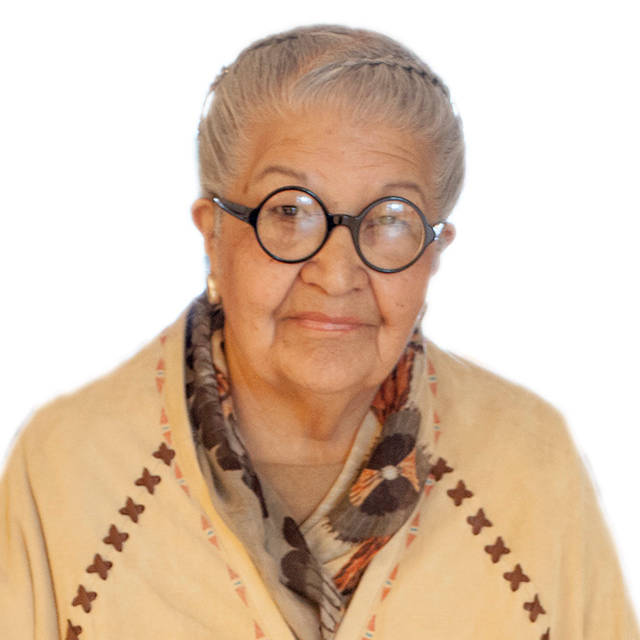
Jan Kahehti:io Longboat
Turtle clan of the Mohawk Nation
Read Bio
Jan Kahehti:io Longboat, Turtle clan of the Mohawk Nation is a knowledge keeper, educator, writer, herbalist, cultural advocate, and visionary having dedicated her life to the dissemination and learning of Indigenous language and culture. She shares her knowledge of Earth teachings, storytelling, fasting, dreams, visions, medicine teachings, women’s roles and relationships, Haudenosaunee wampum belts, leadership, environmental changes, and the impact that her original language has on understanding important values for life. Kahehti:io is the keeper of the Earth Healing Herb Gardens and Retreat Centre at Six Nations. She believes our ancestors left us a great legacy of Indigenous knowledge with which we can carry our spiritual, physical, mental and emotional medicine bundles.
Longboat ran a ten-year program called Idawadadi, which won the Aboriginal Healing Foundation’s best practices award, and an outgrowth project entitled Dotah’s House to assist Indigenous women survivors to heal from the abuse of Residential schools while strengthening their communities through cultural knowledge. She has produced numerous articles, interviews, books, DVDs, audio CDs, radio and television shows, including her own publications the book “Idawadadi: Coming Home”, DVD set “The Cycles of Mother Earth”, and a booklet “Fasting: The natural healer for body, mind, spirit and emotions”. As early as 1983, Longboat founded the Haudenosaunee Women’s Circle.
Frequently called on as a counselor, committee and board member, Longboat has served on the Centre for Indian Scholars, Association of American Indian Physicians, Chiefswood National Historic Society Board, Six Nations Elders Council, Kanatsiohare:ke Mohawk Community and the Children’s Aid Society of Brant, among others. Most recently she was invited to participate in the Canadian Centre for Accreditation to assist in the writing of standards for Indigenous policies. Kahehti:io continues to serve as a board member at the St. Michael’s Hospital Well Living House in Toronto to organize an Indigenous maternal health care information centre, as well as on the elders council at the University of Toronto, Enaahtig Healing Lodge and Learning Centre, and the Native Canadian Centre of Toronto.
Longboat is currently an Indigenous Knowledge Keeper/advisor to the Ministry of Justice Aboriginal Court in Brantford, the Indigenous Justice Division. She taught at Mohawk College, McMaster University, and the University of Toronto and has worked with several Aboriginal health centres including Wabano, Desdwadadesnye and SOHAC.
Kahehti:io is recognized in her community and internationally, having received an Honorary Doctorate of Laws from Guelph University in 2011; the Six Nations Treasure Award in 2010; the “Peace Award” from the Indigenous Women’s Initiative in 2008; and the Smithsonian’s National Museum of the American Indian “Peacemaker Award” in 2007. In 2017 she received the Indspire Award for Culture, Heritage, and Spirituality, the Order of Canada, and the Einstein Legacy Foundation Award. Longboat received her degree as a Natural Health practitioner from the London School and Canadian College of Natural Healing and received a degree in counselling from Laurentian University. She continues to live, teach, write and garden on Six Nations of the Grand River where she was born and raised.

Dawn Martin-Hill, PhD
Mohawk, Six Nations
Paul R. McPherson Indigenous Studies Chair, McMaster University
Read Bio
Dr. Dawn Martin-Hill (Mohawk, Six Nations) holds a PhD in Cultural Anthropology and is one of the original founders of the Indigenous Studies Program at McMaster University. She is the inaugural Paul R. McPherson Indigenous Studies Chair.Dr. Martin-Hill’s research is grounded in the principle that solution-based research in the area of Indigenous health must occur alongside building capacity for community collaborations. She has embodied this principle through her numerous community commitments: including serving as Chair of the Indigenous Elders and Youth Council to promote the protection and preservation of Indigenous Knowledge systems; serving as an expert witness on traditional medicines; and supporting reconciliation efforts to improve health services delivery to FN through the “Harmonization of Traditional Medicine” in partnership with Six Nations Health Services. While working with communities, Dr. Martin Hill has led numerous grants funded by both SSHRC and CIHR to conduct Indigenous knowledge research focused on Indigenous youth, women, language, ceremonies, traditional medicine and well-being.
Dr. Martin-Hill has served on review committees for CIHR and the Social Sciences and Humanities Research Council. She is currently a member of the Editorial Board of Sociology and Anthropology and a reviewer for The International Indigenous Policy Journal. In addition, Dr. Martin-Hill has led important groundwork for Indigenous peer review capacity in her role as the inaugural chair of Aboriginal Health Research Networks (AHRNets) secretariat. Much of this work included identifying and removing epistemological barriers to Indigenous Knowledge health research. She also worked to develop a cohort of potential Indigenous Knowledge peer reviewers for CIHR-IIPH.
Currently, Dr. Martin Hill is the Principal Investigator on the interdisciplinary “Co-Creation of Indigenous Water Quality Tools” project funded through the Global Water Futures. She is also a co-investigator on “Sensors and Sensing Systems for Water Quality Monitoring”, a second Global Water Futures project. She has recently been awarded a Fulbright Community Leadership Program Grant entitled “Contemporary Tools for Intergenerational Knowledge Transmission”.
She resides on the Grand River, Six Nations. She is a single mother of four with two teenagers at home and a grandmother of eight, her healthy family is considered her greatest achievement to date.
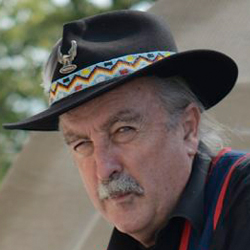
Larry McDermott
Algonquin
Executive Director, Plenty Canada
Read Bio
Larry McDermott (Algonquin), a senior advisor to Friends of Laura Secord, is executive director of Plenty Canada, an Aboriginal non-government organization devoted to the protection of Mother Earth, building healthy communities, and promoting cross-cultural awareness of the value of indigenous ways of knowing to achieve a sustainable environment for future generations. A former three-time mayor and council member of Lanark Highlands and chair of the Rural Forum of the Federation of Canadian Municipalities, he is commissioner of the Ontario Human Rights Commission, and a member of numerous organizations including the International Indigenous Forum for Biodiversity, the Ontario Species at Risk Public Advisory Committee, the Canadian Environmental Network, UNESCO, and the Ontario Recovery Strategy for the American Eel.
Larry also has served as a comprehensive claim representative for Shabot Obaadjiwan First Nation, is a certified tree marker and butternut assessor, and holds other environmental certifications. He lives in a 170-year-old log home on 500 acres of biologically diverse Algonquin land along the Mississippi River.

Faisal Moola, PhD (Moderator)
Associate Professor,
Department of Geography, University of Guelph
Read Bio
Dr. Faisal Moola, PhD is an Associate Professor in the Department of Geography at the University of Guelph. Prior to joining the University of Guelph, he worked for the David Suzuki Foundation for over 15 years, where he was the organization’s Director General for Ontario and Northern Canada. Faisal has a PhD in biology from Dalhousie University and has published widely in scientific journals on topics of ecology, conservation biology, and environmental policy. Faisal is a regular contributor to the Toronto Star, Vancouver Sun, Globe and Mail, CBC and other media outlets as an opinion writer and political analyst on conservation, Indigenous Rights and other environmental and social issues.
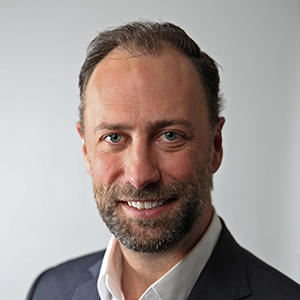
Ry Moran
Métis
Director, National Centre for Truth and Reconciliation
Read Bio
As the first Director of the National Centre for Truth and Reconciliation (NCTR), it is Ry Moran’s job to guide the creation of an enduring national treasure – a dynamic Indigenous archive built on integrity, trust and dignity. Ry came to the centre directly from the Truth and Reconciliation Commission of Canada (TRC). On the TRC’s behalf, he facilitated the gathering of nearly 7,000 video/audio-recorded statements of former residential school students and others affected by the residential school system.
He was also responsible for gathering the documentary history of the residential school system from more than 20 government departments and nearly 100 church archives – millions of records in all. Before joining the TRC, Ry was the founder and president of YellowTilt Productions, which delivered services in a variety of areas including Aboriginal language presentation and oral history. He has hosted internationally broadcast television programs, produced national cultural events, and written and produced original music for children’s television. Ry’s professional skills and creativity have earned him many awards, including a National Aboriginal Role Model Award, and a Canadian Aboriginal Music Award. Ry is a proud member of the Métis Nation.

Earl Nowgesic, RN, PhD (Moderator)
Anishinaabe, Kiashke Zaaging Anishinaabek
Assistant Scientific Director, CIHR Institute of Indigenous Peoples’ Health
Read Bio
Dr. Earl Nowgesic is Ojibwe (Anishinaabe) from Gull Bay First Nation (Kiashke Zaaging Anishinaabek). Dr. Nowgesic is the Assistant Scientific Director of the Institute of Indigenous Peoples’ Health at the Canadian Institutes of Health Research (CIHR). He is a Status-only Assistant Professor in the Dalla Lana School of Public Health and an Adjunct Lecturer in the Lawrence S. Bloomberg Faculty of Nursing, University of Toronto (U of T).
Dr. Nowgesic has over 20 years of experience working in the health sector. He has been the Interim Associate Director and Interim Director of the U of T Waakebiness-Bryce Institute for Indigenous Health and the Director of the First Nations Centre of the National Aboriginal Health Organization. He was the inaugural Associate Director of the CIHR Institute of Aboriginal Peoples Health, and the first Epidemiologist for the Assembly of First Nations.
With the Canadian government, Dr. Nowgesic has held positions as a federal field epidemiologist and the National HIV/AIDS Program Specialist-First Nations and Inuit. His career is founded on his work as a registered nurse in Ontario. Among the academic positions he has held, Dr. Nowgesic has been an Assistant Professor of Public Health at U of T and an Adjunct Assistant Professor of Human and Social Development at the University of Victoria in British Columbia. He has held competitive grants, including the CIHR Fellowship in Health Services and Population Health HIV/AIDS Priority Announcement.
He has published papers in the areas of HIV, tuberculosis, nursing, public health, and research capacity and infrastructure. Dr. Nowgesic holds a Doctor of Philosophy in Public Health Science (specializing in Social and Behavioural Health Sciences) and a Master of Health Science in Community Health and Epidemiology from U of T and a Bachelor of Science in Nursing from the University of Ottawa.
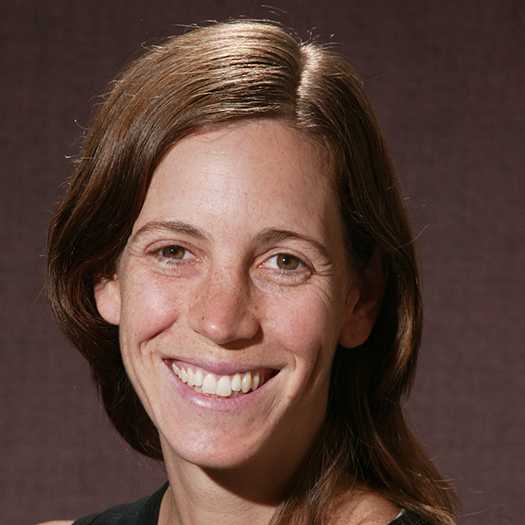
Rachel Plotkin
Ontario Science Projects Manager, David Suzuki Foundation
Read Bio
Rachel Plotkin has worked at the David Suzuki Foundation for over a decade. Her work focusses on the protection of wildlife habitat and the support of Indigenous peoples as decision-makers over their traditional territories. She holds a Masters degree in Environmental Studies, and a teaching degree in outdoor and experiential education. Her favourite animal is the badger (although she has never seen one).
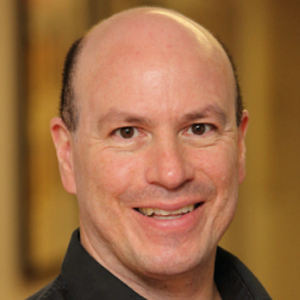
Kent Saylor, MD, FRCPC
Kahnawake Mohawk
Paediatrician, Northern & Native Child Health Program, Montreal Children’s Hospital
Read Bio
Dr. Saylor is a member of the Mohawk Nation. He is a consultant pediatrician working with the Northern and Native Child Health Program of the Montreal Children’s Hospital. He has worked for many years as a consultant pediatrician for Algonquin, Attikamek, Cree, Inuit and Mohawk children of Quebec. He is the former chair of the First Nations, Inuit and Métis Health Committee of the Canadian Paediatric Society. More recently Dr. Saylor has taken on the roles of Director of the Indigenous Health Curriculum and the Director of the Indigenous Health Professions Program at the Faculty of Medicine of McGill University.

Robert Schroth, DMD, MSc, PhD
Associate Professor, Department of Preventive Dental Science (College of Dentistry),
Departments of Pediatrics & Child Health and Community Health Sciences (Max Rady College of Medicine),
Rady Faculty of Health Sciences, University of Manitoba
Read Bio
Dr Schroth is an Associate Professor in the Department of Preventive Dental Science (College of Dentistry) and the Departments of Pediatrics & Child Health and Community Health Sciences (Max Rady College of Medicine) in the Faculty of Health Sciences at the University of Manitoba. He is also a research scientist at the Children’s Hospital Research Institute of Manitoba. Dr. Schroth is a dental clinician-scientist, practicing out of two inner city community-based dental clinics in Winnipeg. His research focuses on early childhood oral health and the epidemiology of Early Childhood Caries (ECC) in at-risk populations particularly among Indigenous children.
Some of his work has examined the role of prenatal factors, including vitamin D levels, on the oral health of infants and preschool children. His research has also documented associations between ECC and poor nutritional status. He also co-facilitates an early childhood oral health promotion and ECC prevention project in Manitoba, Healthy Smile Happy Child, which uses community development principles to promote oral health, and includes program evaluation and research. He holds a CIHR Embedded Clinician Researcher salary award in “Improving access to oral health care and oral health care delivery for at-risk young children in Manitoba”. He currently leads two CIHR funded studies – one evaluating the Children’s Oral Health Initiative and the other which is “scaling up the Healthy Smile Happy Child initiative: tailoring and enhancing a community development approach to improve early childhood oral health for First Nations and Metis children”.

Hannah Tait Neufeld, PhD
Assistant Professor, Department of Family Relations and Applied Nutrition, University of Guelph
Read Bio
Hannah Tait Neufeld is of mixed heritage, originally from Fort Erie, Ontario. She is currently an Assistant Professor at the University of Guelph in the Department of Family Relations and Applied Nutrition. Her research focuses on Indigenous health inequalities, taking into consideration community interests, along with environmental factors influencing maternal health, and Indigenous food systems.

James Taylor DMD MA
Chief Dental Officer, of Canada at the Public Health Agency of Canada
Read Bio
Following his retirement as Chief Dental Officer (CDO) of the Canadian Armed Forces, James was appointed as the CDO of Canada at the Public Health Agency of Canada. His role in the Federal Health Portfolio and indeed across the federal government is to work with key public and non-public elements of the Canadian health community, and indeed our global counterparts, to improve the oral health of Canadians and particularly that of our most vulnerable populations; he also works to foster the awareness of oral health as a key factor in general health. Among other service roles in the international oral health community, James currently serves as the Secretary of the FDI World Dental Federation Section of CDOs & Dental Public Health, as a member of the steering committee for the Network for Canadian Oral Health Research; as a member of the Standards Council of Canada delegation to the ISO Technical Committee 106 on Dentistry, and as a reviewer for the Canadian Journal of Public Health.
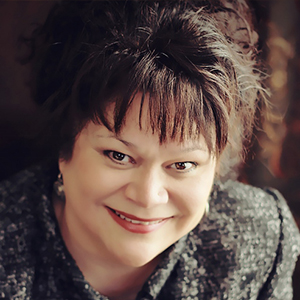
Cheryl Ward
Kwakwaka’wakw, ‘Namgis First Nation
Interim Director of Indigenous Health,
Provincial Health Services Authority, BC
Read Bio
Cheryl Ward is Kwakwaka’wakw from northern Vancouver Island and a member of the ‘Namgis First Nation. She is currently the Interim Director of Indigenous Health at the Provincial Health Services Authority in BC, home to the San’yas Indigenous Cultural Safety training program. Since 2008 Cheryl has been a lead on San’yas including leading the curriculum development of the program, which has now trained over 40,000 people in Canada. Cheryl continues to enact her commitment to social justice education, Indigenous cultural safety, and decolonizing anti-racist pedagogy through her doctoral studies in education at Simon Fraser University.

Maggie Wente
Serpent River First Nation
Partner, Olthuis, Kleer, Townshend LLP
Read Bio
Maggie Wente is a partner at OKT. She is a member of Serpent River First Nation. Maggie has a broad practice serving First Nations governments, their related entities, businesses and not-for-profit corporations. Maggie advises on Treaty and Aboriginal rights in litigation and negotiation, the duty to consult and accommodate, Indian Act matters, reserve land management, and First Nations governance. Maggie also provides employment, labour and human rights advice to OKT’s clients. Maggie has a particular interest in working with her clients to on develop and implement sound governance policies and practices which reflect their traditional laws, as a foundation of self-determining Nations.
Maggie has appeared in courts of appeal and trial-level courts in Ontario, Newfoundland and Labrador, and the Federal Court, as well as before arbitrators and adjudicators in commercial arbitrations, labour arbitrations, and adjudications under the Canada Labour Code.
Maggie graduated from the University of Toronto’s combined LL.B/M.S.W. program and from McGill University (B.A., Philosophy). Maggie is past-President and current Vice-President of the Board of Directors at Aboriginal Legal Services of Toronto. She was a Commissioner at the Ontario Human Rights Commission from 2006 to 2015.
Maggie is a member of the Indigenous Bar Association, the Ontario bar and the Newfoundland and Labrador bar.

Fred Wien, PhD
Professor Emeritus, Dalhousie University
Read Bio
Fred Wien has an Honours B.A. in Political Studies and Spanish from Queen’s University (1962-66), and an M.A. and PhD. in Development Sociology, Government and Latin American Studies from Cornell University (1966-71). He served as Director of the Maritime School of Social Work at Dalhousie University from 1981-86. Between 1992-96, Dr. Wien served as the Deputy Director of Research at the Royal Commission on Aboriginal Peoples where he headed the research program on employment and economic development.
At the national level, he has served as a member and chair of the Advisory Board for the Institute of Aboriginal Peoples Health (IAPH/CIHR). He is the Nominated Principal Investigator for the project funded by CIHR: “A Poverty Reduction Approach to Improving the Health and Well-being of First Nation Communities in Canada”. He is also the NPI for a CIHR-funded project on “Building a Social Policy Framework for the Health and Well-being of Mi’kmaq Communities in Nova Scotia”. At the request of Mi’kmaq and Maliseet organizations and with funding from Indigenous and Northern Affairs Canada, this research has been extended to the Maritime provinces with a focus on social assistance policy on reserve.
He co-chaired (with Dr. Rod McCormick) the national Aboriginal Health Research Steering Committee which made recommendations to CIHR about support for Indigenous health research in Canada. He also co-chaired (with Marlene Brant Castellano) the national forum “Our Land, Our Future” to mark the 20th anniversary of the Report of the Royal Commission on Aboriginal Peoples.
He holds a professor emeritus appointment at Dalhousie University, and was made a Member of the Order of Canada in December, 2015.
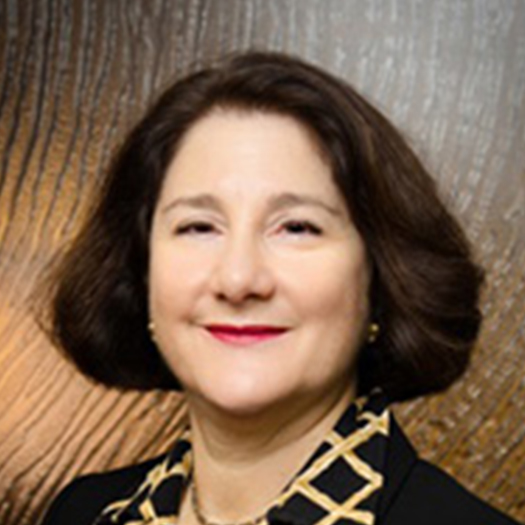
Susan Zimmerman
Executive Director, Secretariat on Responsible Conduct of Research
Read Bio
Susan Zimmerman is the Executive Director of the Secretariat on Responsible Conduct of Research in Ottawa. SRCR is responsible for the implementation of the Tri-Agency Framework on Responsible Conduct of Research on behalf of the Canadian Institutes of Health Research (CIHR), the Natural Sciences and Engineering Research Council (NSERC) and the Social Sciences and Humanities Research Council (SSHRC). The Secretariat is also responsible for the Tri-Council Policy Statement: Ethical Conduct for Research Involving Humans.
She is a lawyer whose career has focused on health law and public policy. A native of Montreal, Susan received her undergraduate degree from Bryn Mawr College, civil law and common law degrees from McGill University, and a Master of Laws from the University of Toronto. Her professional experience includes positions as a senior research associate at the Centre for Medicine, Ethics and Law at McGill University, Director of Legislation and Law Reform at the Canadian Bar Association, legal counsel at Health Canada and Director of Research for the Law Commission of Canada. Prior to her appointment to the Secretariat in September, 2007, Ms Zimmerman was a member of the Health Law Group at the Toronto office of a national law firm, where she represented health care institutions and a variety of health care professionals.
Ms Zimmerman has also been a university lecturer in health law and ethics and a member of research ethics boards.
